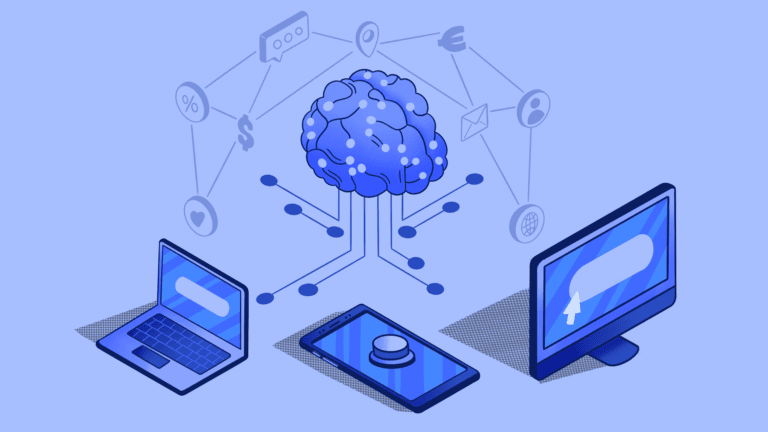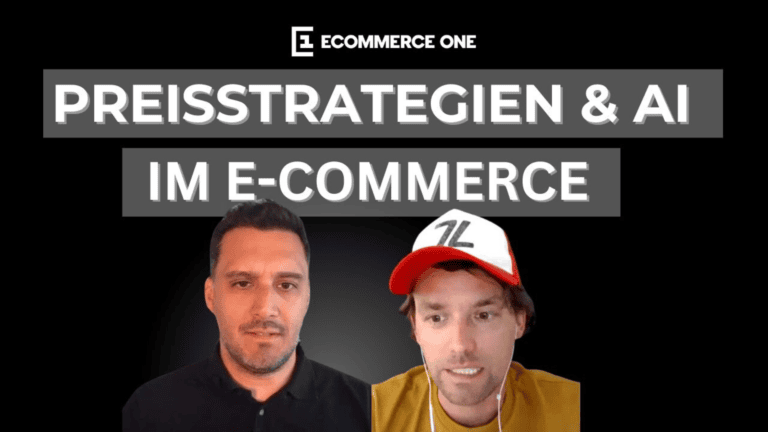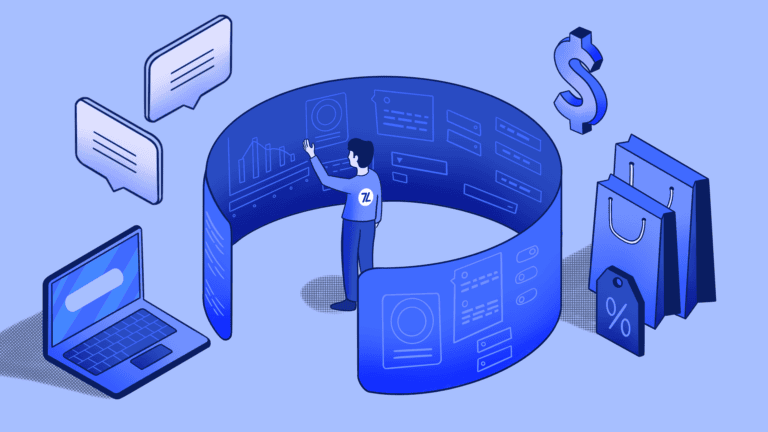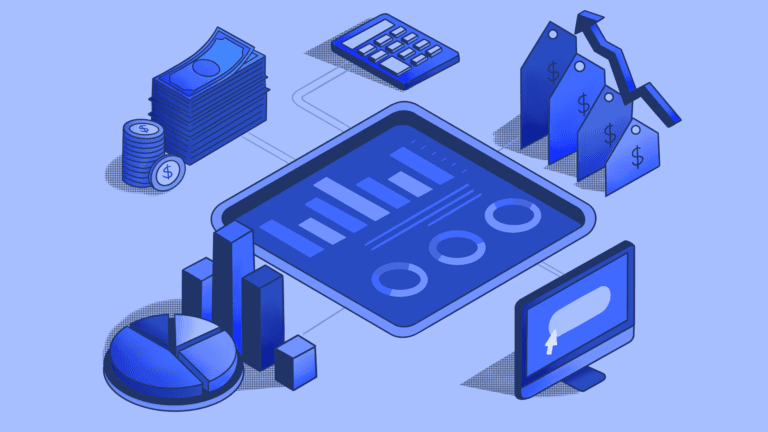Pay-per-click (PPC) campaigns have been crucial drivers of online marketing success for years. However, ads became more and more expensive, and the return on ad spend decreased significantly. With the rise of AI, we enter a new golden era of PPC marketing as companies are able to optimize their campaigns for maximum success holistically.
We’ll explore how artificial intelligence acts as a magic ingredient for PPC optimization, what challenges companies need to prepare for, and how they best leverage the power of AI for their marketing.
What is PPC marketing?
Let’s recap the nature of PPC marketing before diving into the current state-of-the-art approach to it.
Pay-per-click marketing is a subset of performance marketing where companies only pay a fee if and when one of their ads are clicked and a user is directed to a specific website where they can purchase a product or service. Essentially, it’s a way for businesses to buy visits to their website instead of publishing content to gain visibility in an organic way.
PPC campaigns can be done on social media platforms, search engines, online marketplaces, and other websites. Search engine advertising is one of the most popular forms of PPC: Companies bid for an ad placement for specific keywords. The cost of having their ad shown is determined by different factors such as the competitiveness of the keyword, quality of the ad, and maximum budget per click.
The evolution of PPC marketing
The history of performance and PPC marketing dates back to the mid-1990s. Back then, it was a game-changing departure from the standard impression-based billing model. The foundation of the modern PPC marketing ecosystem we know today was laid when Google launched Google AdWords in 2000, introducing its keyword targeting, cost-per-click model, and bidding options.
At first, companies had to adjust their bids manually based on past performance metrics. They experimented with different keywords to bid on and did A/B tests on ad copy to optimize traffic and conversions of their landing pages. However, these methods were and are time-consuming and are unable to take real-time market changes into account.
Later, ad platforms offered automated bidding where bids were adjusted depending on competitor behavior or conversion goals. The PPC optimization technology, however, was limited and struggled to process the vast quantities of data generated by campaigns, leading to less precise targeting and suboptimal allocation of advertising budgets.
With the advent of AI and machine learning, PPC optimization strategies reach a new level of quality and speed. Many of the earlier limitations are now in the past. AI-based tools use dynamic campaign optimization that is based on near real-time advanced data analysis of a vast amount of different data and thereby allow higher personalization, better conversion rates, and improved return on ad spend (ROAS) for advertisers.
Understanding the role of AI in PPC optimization
Artificial Intelligence (AI) encompasses technologies that enable machines to mimic human intelligence and decision-making processes.
Machine learning (ML) is a subset of AI. ML algorithms analyze structured data, identify patterns and improve their decisions automatically through experience. The most sophisticated AI technology is deep learning, a subset of ML.
Deep Learning uses neural networks with multiple layers to analyze complex patterns in large unstructured data sets and solve complex tasks that historically only humans were able to solve.
In the context of performance marketing optimization, artificial intelligence and its subsets have transformative powers as they offer advanced capabilities to analyze and interpret vast amounts of data from ad campaigns. They reliably detect patterns that humans easily miss. By doing so, these technologies are able to predict user behavior, determine the most effective ad placements, and optimize bids in real-time, leading to significant improvements in campaign performance.
AI-based PPC marketing optimization not only minimizes manual effort but maximizes ROAS and is an indispensable tool in a modern marketer’s toolkit.
Use cases for AI in PPC optimization
There are lots of steps in the process of creating a successful PPC campaign. In most of these, AI can enhance the results.
In some of the process steps, AI is already widely in use and retailers have a huge variety of tools to choose from:
- Keyword research: AI algorithms can sift through massive amounts of data to identify high-performing keywords and discover niche terms to optimize search visibility.
- Ad targeting: By analyzing user data and behavior, AI ensures ads are only shown to the most relevant audience segments.
- Ad creation: AI tools can generate and test various ad copies and creatives and identify those that resonate best with the target audience.
- Bid optimization: AI analyzes bidding in near real-time and makes adjustments to a company’s bid while staying within budget constraints to maximize ad visibility.
In other process steps, there has been none or only a few AI solutions available so far, although the technology can have an immense impact.
- Predictive Analytics and Forecasting: AI algorithms can analyze past campaign performances and simulate future campaign outcomes. As a result, companies can easily “try out” different campaign approaches with zero risk and lower their effective cost of learning.
- Automation and Efficiency Gains: Also, routine tasks that needed to be done by campaign managers can now be automated and done by AI-powered tools in a fraction of the time, i.e. copy changes or budget adjustments for long-running campaigns.
No matter where you start implementing AI, All measures will incrementally increase your efficiency in creating effective PPC campaigns and improve traffic to and conversions of your landing pages.
The next generation of AI for PPC
AI technology is constantly evolving. Most AI tools currently focus on pre-purchase optimization of PPC marketing but neglect using post-purchase data to increase overall campaign results. That’s where 7Learnings AI-powered performance marketing optimization tool comes in.
We employ advanced AI algorithms that analyze a vast data set with pre-purchase and post-purchase metrics. We not only consider direct campaign data like cost of clicks, total clicks, conversion rates, and marketing spend but also sales data, return data, and outbound costs.
On this broad database, our AI-powered PPC optimization solution will recommend how to steer the campaign depending on the retailer’s set goal (clear inventory, up overall profits, increase margin for a specific product or similar). Users get daily forecasts on all important metrics like profits, revenue, conversions, and cost per click, allowing for maximum transparency. Retailers can also use inventory level predictions to adjust their marketing decisions and simulate how price changes affect clicks and conversions.
Manual effort is greatly reduced as most of the optimization work is automated or can be done from 7Learnings’ central platform.
Our customers achieve an average of 15% profit uplift after using our platform for only a few weeks.
Synchronizing marketing and pricing activities
In most companies, marketing and pricing teams still work separately, although both drive customer demand. Optimization in one area isn’t taken into account in the other, and companies miss out on a valuable opportunity to increase profit.
Let’s look at some examples: Increasing ad spend might very well lead to more traffic on a sales page, but if the price of the advertised product is too high, sales numbers stagnate, and the marketing budget will be burned. In another scenario, companies don’t leverage their high conversion rates because their prices are too low, and the overall return on investment ends up being negative.
What sets 7Learnings’ solution apart is our holistic approach. Our AI solution creates a joint forecast showing how marketing and sales activities will affect each other and the campaign’s overall performance. Thus, retailers can avoid sabotaging their success with silo thinking. Cross-optimization becomes as easy as pushing a button which is a huge advancement in the way retailers maximize growth and profitability.
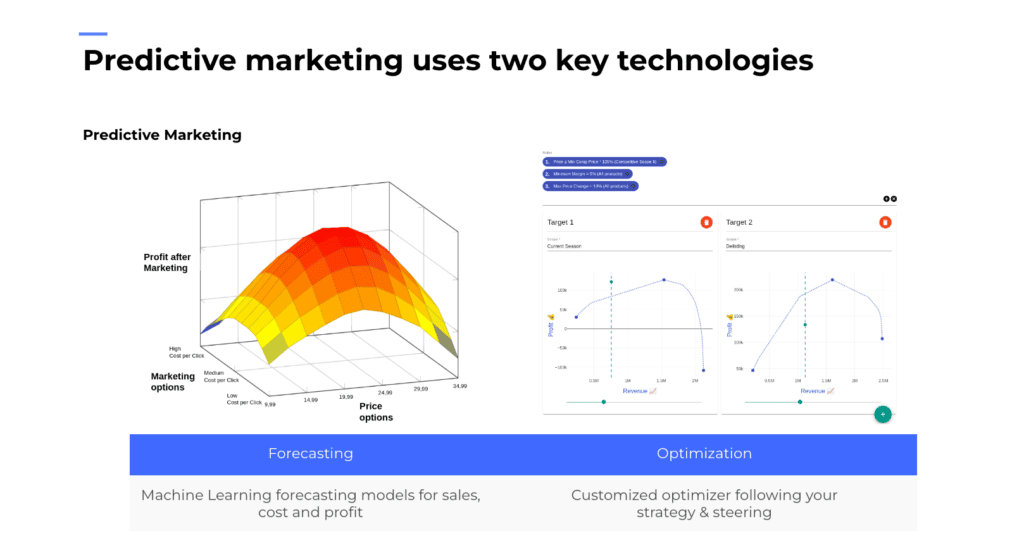
Challenges and considerations
AI tools are a game changer for PPC marketing: companies have never been able to achieve better results with less effort. However, like any new technology, AI also has potential weaknesses that companies should be aware of when choosing quality solution providers and managing risks responsibly. Here are some key questions retailers should ask about any AI in PPC marketing.
Data quality and quantity
What kind of data sources is the AI in the PPC solution using? How is the quality of the data? If you want accurate analyses and predictions, AI needs comprehensive, high-quality data from a broad base of different data sources, internal and external data.
Integration and compatibility
Is the AI solution compatible with your existing digital systems, or do you need to make adjustments in advance? Integrating AI tools with existing marketing platforms can be complex, requiring technical expertise to ensure seamless operation and data flow.
Ethical and privacy issues
Where is the data stored that AI-based PPC marketing tools use? Is the data used in compliance with local regulations? Companies need to make sure their data privacy and IT security are not compromised by implementing AI solutions.
Future trends and predictions
Marketing has shifted towards data-driven decision-making for several years now. AI PPC tools just mark another big step in this evolution. Companies leveraging the most advanced AI algorithms to optimize their PPC campaigns will be the ones outperforming the competition.
In this dynamic marketing technology landscape, 7Learnings is a frontrunner. Our AI-powered PPC optimization platform offers unparalleled precision and campaign results. The reason is our advanced AI algorithm that synchronizes pre-purchase and post-purchase data and delivers superior results for our customers.
Key learnings
- Using AI in PPC marketing is a game changer for ROAS and efficiency, as it minimizes manual efforts and improves results by analyzing vast amounts of data.
- AI is already widely used in the automation of bid adjustments, ad targeting, and copy optimization based on historical data.
- 7Learnings offers a unique holistic approach: Its AI-powered platform synchronizes marketing and pricing strategies, leveraging pre- and post-purchase data for comprehensive optimization.
- Companies must navigate challenges that come with implementing AI in PPC campaigns such as data quality, integration, and ethical considerations.
- The future of marketing is data-driven, and AI PPC tools will be a key differentiator for companies seeking a competitive advantage.
